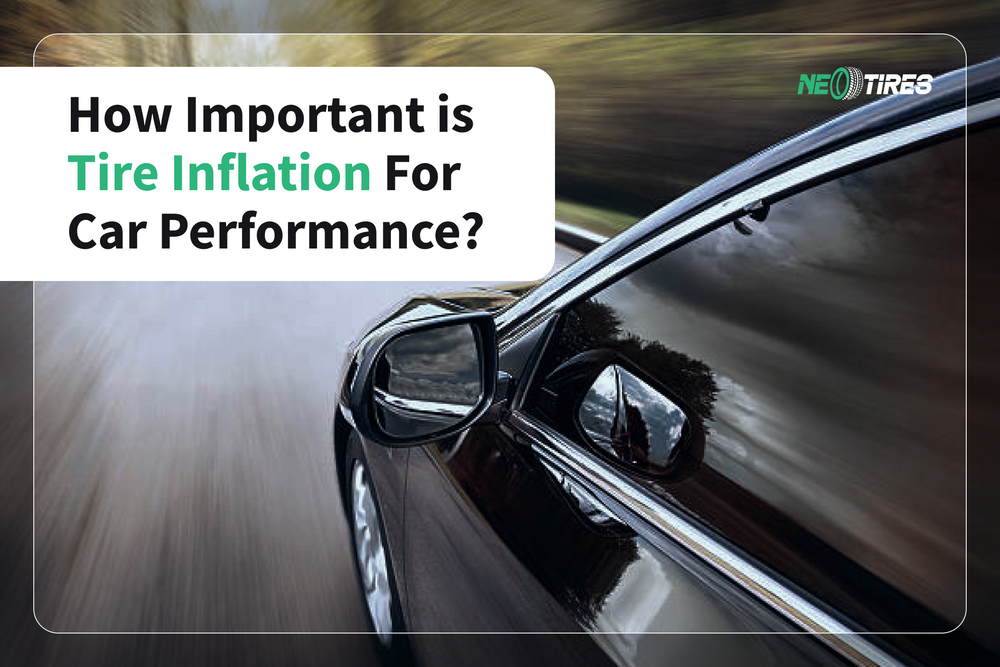If you are an active reader of our blog, you probably noticed that we often mention how important your tire pressure is. Our insistence has a wise explanation; The pressure in your tires is the essential factor that makes your car perform or stagnate on the road. Also, it is responsible for the fuel consumption of your car. At the same time, the tire pressure is one that directly influences the wear of the tires. And we think that, like many other drivers, you want your tires to last as long as possible, don't you?!
Besides all these roles, pressure plays another essential role: it impacts the overall handling of the car on the road. And that implies stability, safety, grip, traction, and the comfort of the driving experience.
So, the conclusion is that proper tire inflation is the answer to a multitude of issues that you notice in your car. By the way, this applies to both scenarios when you overinflate or underinflate your tires.
In this context, rule number 1 is to keep the pressure level constant and correct. Checking the pressure is an intermittent obligation. Maintaining optimal pressure is your moral duty. And please, ignore the recommendations of the "great experts" who keep instilling in you that under or over-inflated tires are beneficial for certain reasons. The only one you have to take notice of is your tire manufacturer, who will tell you what the correct pressure limit is. Why is it important to keep this limit? We will find out in the following post.
Proper Tire Inflation Is Beneficial For The Tire
The longevity of your tires depends on many criteria. One of them is proper inflation. Once you go out of the recommended limits, the tires start to submit to the destructive effect, which leads to a shorter life.
If we talk about the over-inflation scenario, the tire tread surface tends to flatten. Consequently, the tire loses its grip force on the road, putting at risk the stability of the vehicle, especially at high speeds. You will feel that the car takes flight every time you speed over a certain road barrier and dumps, losing control over it.
If you think that the under-inflation scenario is more positive, you are wrong. Once the tires have reduced pressure, they contact the road on a larger surface. Consequently, a larger contact patch rubs against the road leading to premature tire degradation. At the same time, each tire can wear unevenly. And uneven tire wear is not at all beneficial for the traction of your car.
Tire Inflation Impact On Gas Mileage
Many poorly experienced drivers complain that their vehicle consumes more fuel than the manufacturers claim. However, they don't take into account the pressure in their tires, which is the direct cause of overconsumption, most of the time.
Many internet sources, as well as "experienced neighbors" support the idea that under or over-inflation is beneficial for fuel consumption. Both sources can give you dozens of arguments, but I'm afraid that none of them are quite convincing enough. I recommend following the recommendations of the manufacturers who ALWAYS suggest that the pressure limits in the wheels be respected.
Every time you over-inflate the tires, they generate more resistance. On the other hand, tires with insufficient pressure generate more effort for the vehicle to propel them forward. Thus, the vehicle needs more energy to cope with resistance and effort. And what is the vehicle's primary energy source? That's right, it's the fuel. As a result, the car will consume more to cope with the mechanical demands of the vehicle.
In the process of producing tires, manufacturers take into account the goal of making gas consumption more efficient. For this reason, it is no longer necessary to bring the peculiar corrections through over or under inflation, because the manufacturers have taken care of everything. Respectively, the pressure RECOMMENDED by manufacturers assumes efficient fuel consumption. So, stay within the limits of the recommended pressure.
Tire Pressure Influences Vehicle Handling
As we mentioned before, the grip and traction of the tire suffer both with over and under-inflated tires. Respectively, the proper tire pressure provides the optimal grip and traction for the vehicle on the road. Traction and road grip are the most essential components of safe and risk-free driving. Especially, these 2 criteria are crucial when it comes to wet or snowy roads.
Even in the absence of these circumstances (snow and rain), optimal grip and high-performance traction are the fundamental criteria for the car to perform the most effortful and demanding commands such as cornering, and dry and wet braking. So, maintaining wise tire pressure is directly proportional to the performance and safety of your car in these circumstances.
What Can You Do To Prevent Tire Pressure Issues?
Regular tire pressure checkups must be a must for you. In the best-case scenario, checking and adjusting is welcome once a week, because the road can impact the pressure during the week. If this is not possible, establish a monthly schedule for checking them. In the same context, you must make sure that the tire pressure is within normal limits each time you intend a long trip.
If you intend to buy a pressure gauge, opt for a digital or dial one. They indicate the pressure with greater accuracy than the rest of the tools.
You have to understand that the pressure index on the tire sidewall is NOT the recommended average pressure, but the Maximum admissible pressure. Read the driver's manual to find the pressure recommended by the manufacturer, which is the one you need.
Keep in mind that the outside temperature can influence the pressure indicators. For example, the pressure will be 3-5 psi more when the outside temperature drops and the tires are cold. Take into account the tire pressure adjustment when you plan to add some load to your vehicle.
Bottom Line
All the above arguments lead to a single conclusion: under no circumstances should we neglect the pressure in our tires. Besides the impact it brings to fuel consumption and tire wear, it is also responsible for our safety in traffic. And when it comes to safety, there is no room for interpretation.
We have to admit that if we keep the tires properly inflated, we only have a lot to gain. The benefits we enjoy from monitoring and adjusting tire pressure are long-term and provide a pretty comfortable riding experience.
Tire Pressure and Car Performance: FAQs
Does Tire Pressure Affect Performance?
Absolutely. The air level in the tires directly influences the vehicle's behavior on the road. If there is too little air, the steering becomes more "lazy" and the vehicle's maneuverability more difficult. In addition, with less pressure, the tire leaves more footprint on the road. This influences the braking distance which becomes longer and also the fuel efficiency which decreases significantly. A longer braking distance increases the risk of collision in emergencies. More pressure leads to uneven tire wear and makes the vehicle bumpier, especially at high speed. This also increases the risk of losing control, especially if the driver does not have enough experience.
Does Lower Tire Pressure Give a Smoother Ride?
Many drivers tend to reduce the pressure to get a smoother ride. In fact, there are more disadvantages than advantages in dropping pressure deliberatively. While a 1-2 PSI drop will insignificantly improve comfort, the tire will undergo early and uneven tire wear. This means that you will have to change it sooner than you expect. Also, fuel efficiency will decrease, which again is not advantageous for any driver. Ideally, you should comply with the PSI recommendations of the manufacturer who has already calculated the optimal pressure level for maximum efficiency and performance.
Does Tire Pressure Affect Acceleration?
According to tests and research, lower pressure in tires has a positive effect on acceleration, despite common misconceptions. Lower pressure means more rubber on the road which translates into better grip. However, lowering pressure is not recommended because the tire will degrade sooner and maneuverability will be significantly reduced. So, for safety reasons, drivers should better stick to the recommended PSI.
Why Trust Us?
NeoTires is more than a tire dealer. Our team is also passionate about testing, comparing, and evaluating tires in different road and weather conditions. Our team members have more than 10 years of experience in this field and their knowledge helps us make unbiased and high-quality reviews for the products we offer. Last but not least, we assist our customers with safety and mechanical questions so that they can improve their experience and safety levels behind the wheel.
With that said, NeoTires is not just about offering the best tire deals. Here we develop, keep up with the new technologies in this field, and explore everything that rubber on the road means. After all, we are happy to share our knowledge and offer our help to drivers who need it. Contact us for any questions related to tires and mechanical service. Our team will gradually help you, just as we have helped thousands of drivers so far. Drive safe and choose your tires wisely!





